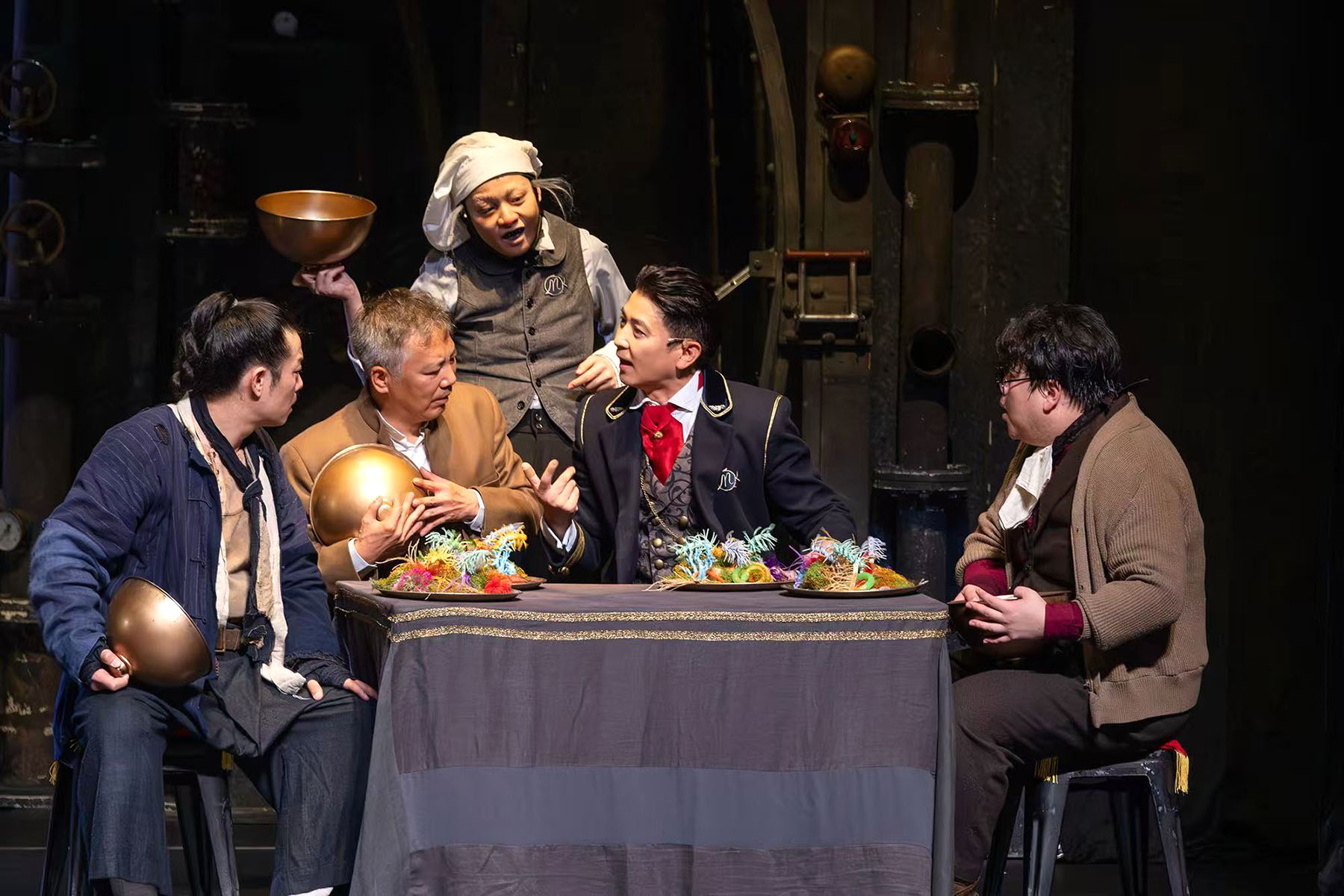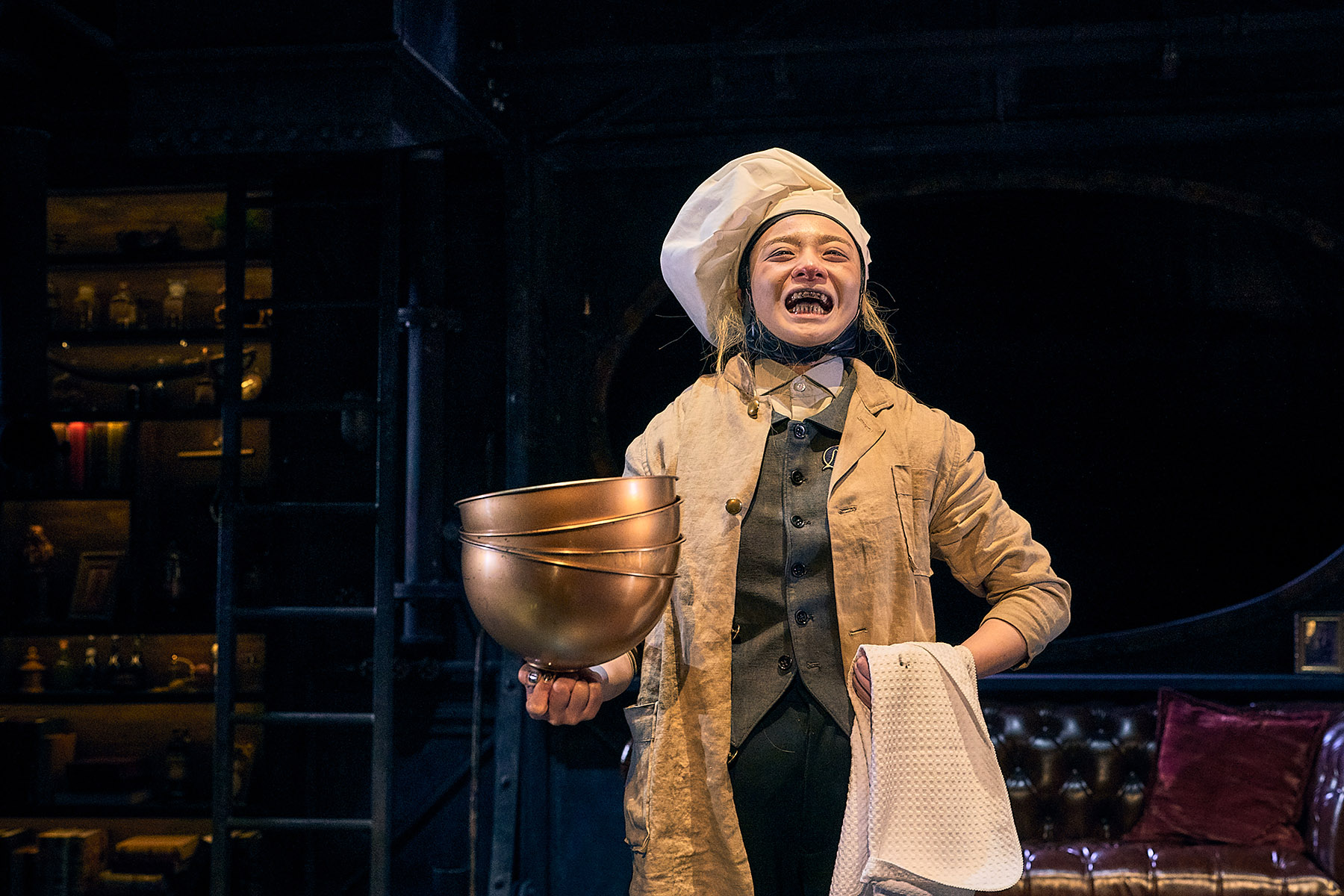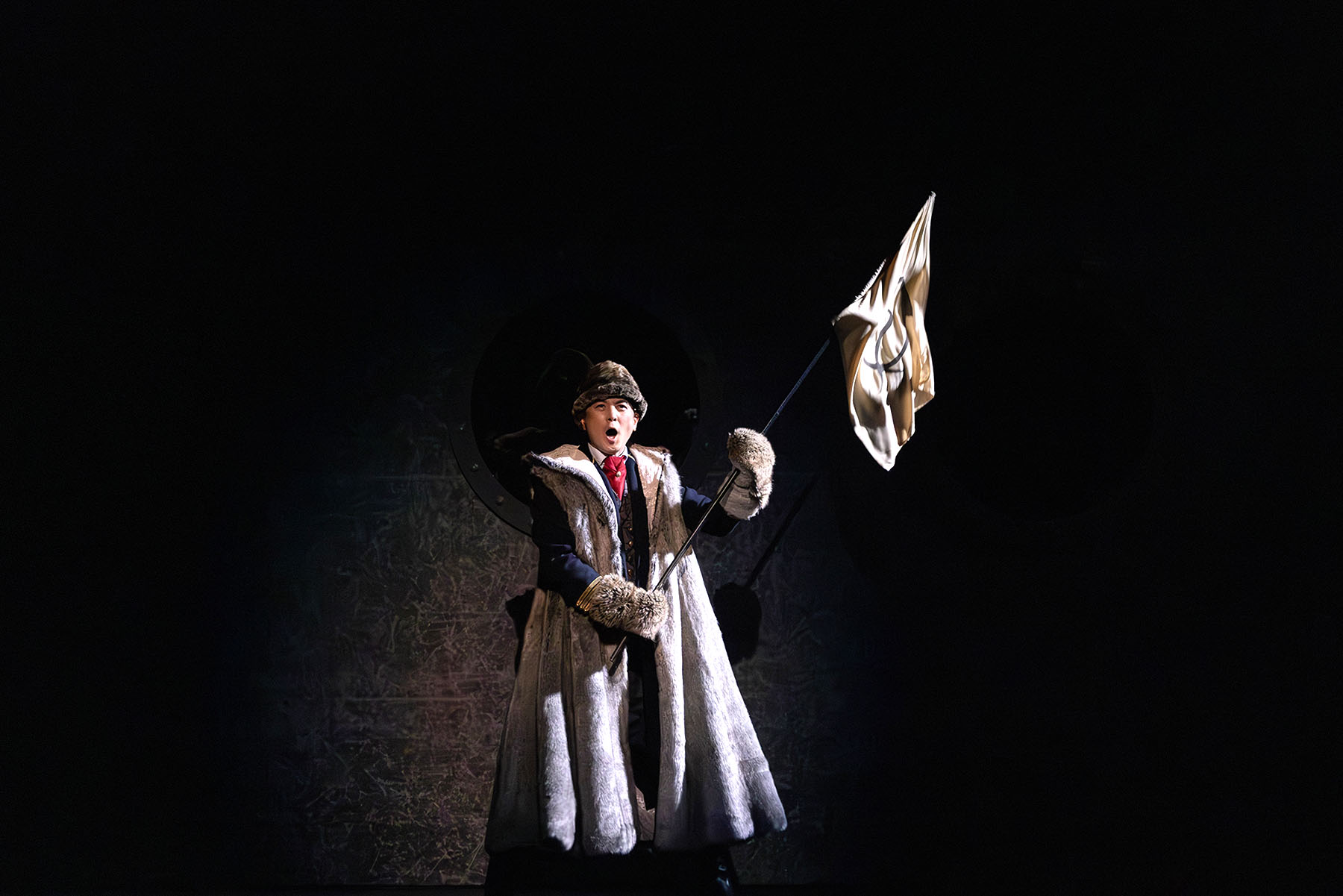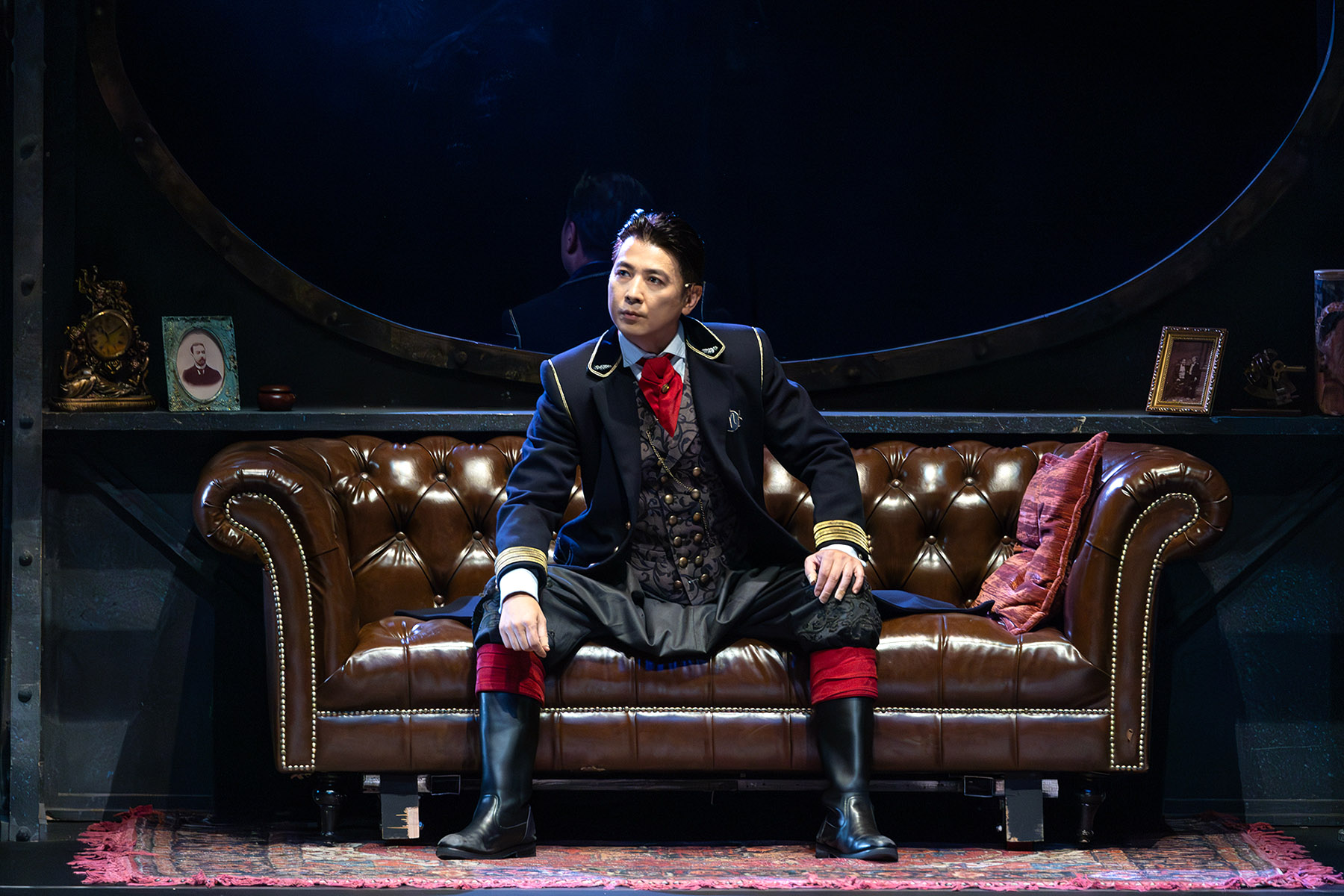Innovative presentation of the adventures of the Nautilus submarine gives audiences a stunning performance, Cheng Yuezhu reports.

A jellyfish bobs up and down, a school of fish flashes by and disappears into the darkness, and outside a porthole, an actor rises and falls, as if holding his breath while suspended in the deep sea.
These scenes come from Sino-French sci-fi fantasy production Twenty Thousand Leagues Under the Sea, adapted from the eponymous work of French literary giant Jules Verne, bringing to life its deep-sea adventures.
After being staged at the 53rd Hong Kong Arts Festival and as the opening production of the Festival Croisements 2025, the production made its Beijing premiere at the Beijing Performing Arts Center from July 11 to 20.
Today's stage productions never lack stunning visual effects, yet what is special about this one is its authentic, classic theatrical methods. Instead of using digital technology, the show's spectacle is created by puppetry and physical theater.
READ MORE: Fostering dialogue with artful endeavor
All the performers act as both human characters and puppeteers. They wear specially designed sheer black costumes and manipulate puppets in the dark, with precise lighting design that conceals them and makes the puppets appear more lively.
"We invite the audience to temporarily set aside their reliance on technological effects and reexperience the purest charm of theater. Living performers are here to create artistic miracles in real time," says the production's Chinese director Zha Wenyuan.
"The puppets are not merely props, but extensions of the actors' bodies. Each underwater creature carries human emotions and thoughts. Just as the original work indicates, technology and humanity can poetically intertwine."

The storyline keeps true to Verne's original plot. Natural scientist Pierre Aronnax, his servant Conseil and harpooner Ned Land set off to hunt a mysterious sea monster. Instead, they discover the Nautilus, a submarine built and manned by Captain Nemo, who invites them to go on adventures under the sea.
TV and film actor Bao Jianfeng is one of the actors who portray Captain Nemo. It's been about 10 years since he last participated in a stage production.
"I've always hoped for an opportunity to come back onstage. Because I respect the stage, I am more prudent in my choices. Twenty Thousand Leagues Under the Sea is precisely the reason I needed. The book has been a window to explore the world since childhood," he says.
He was also curious about how the team would bring the novel to life. Coproduced by the Central Academy of Drama in Beijing, the Hong Kong Arts Festival and performing arts company Tempest Projects, the production is joined by French theater artists, notably Christian Hecq, director and actor from leading French theater company Comedie-Francaise.
Hecq says that what touched him the most about Twenty Thousand Leagues Under the Sea is not written in the book itself, but in another book by Verne, The Mysterious Island.
The book unveils the earlier life experiences of Captain Nemo, who turned out to be a prince forced to exile, flee his own kingdom, and take on a new identity.
"We learn why he is so angry. I really like the fact that he is changeable and unpredictable. He helps people who have no money. He is also a person with a beautiful soul," Hecq says.
"He's not a simple character, but complicated and layered. Paradoxical personalities, to me, are very interesting."

Bao also says that what he finds most interesting about playing Captain Nemo is finding commonalities as humans and understanding the character's complexity.
"Theater is really about exploring human issues and inner conflicts. There are people like Nemo, who is turbulent and temperamental, whose logic can be hard to grasp. Yet every role has some aspects that resonate with us," he says.
"To understand Nemo, to enter his world and explore whether I can make sense of it, is what brings me the greatest joy in my work."
Collaborating with French artists and adapting a French novel, the Chinese crew aimed to respect the original work while shaping a Chinese stage aesthetic that resonates with local audiences.
The localization took place in mainly four aspects, according to Zha — language, visuals, sentiment and performance.
The lines were translated not only faithfully, but also naturally. The translated dialogues aimed to fit the contemporary Chinese conversational context, adding idioms and humorous sayings that are easily understood by Chinese audiences.
Characters' costumes are redesigned based on the performers' physiques and temperaments, giving a touch of Chinese aesthetics while preserving their original identities.

Harpooner Ned Land, for example, dons the outfit of Chinese fishermen in this production, and speaks with folk idioms.
"As we worked with the actor, the character gradually took on the quality of a Chinese wandering hero. The folk idioms in his lines represent wisdom of surviving in the grassroots society, which add a sense of humor and also make the character more down-to-earth," Zha says.
To more closely align the mysterious marine world with the imaginations of Chinese audiences, the crew also introduced underwater creatures inspired by mythology.
Drawing inspiration from the Classic of Mountains and Seas, an ancient Chinese collection of mythological creatures, designer Liu Kaiyin created a dragon-like snakefish puppet, which is operated using traditional Chinese dragon dance methods.
"Localization is not simply a matter of translation and substitution. It's about allowing the work to truly enter the aesthetic and emotional world of the local audience," Zha says.
ALSO READ: Classic submarine novel stirs wave of anticipation
The production has been selected as an excellent program within the "Grand Performances in Beijing" initiative by the Beijing Federation of Literary and Art Circles. It is now going on its national tour to major Chinese cities, with an estimated total of 34 performances this year.
"For young children, this fantasy show offers an engaging stage and captivating visual spectacle, with mysterious sea creatures against a pitch-black background. At the same time, parents accompanying their children to the theater can also discover profound reflections within their own hearts," commented Hugo Award-winning science fiction writer Hao Jingfang after watching the show.
Contact the writer at chengyuezhu@chinadaily.com.cn


